It’s funny how life unfolds. After I decided to start this journal–based on material I already had–I received more fuel for my fire. Lots of fuel. Mom began digging into family history years ago, but she was sitting on a goldmine–the proof, so to speak–about which I’d nearly forgotten. I’d been all abuzz over a 100 year old family letter. I felt compelled* to publish it on the same day–100 years later. And, well, since I’m exceptionally good at taking on complicated projects and making myself and everyone around me crazy, the letter was, in fact, posted on 3/20/2015 (see “Why Grandma Cried,” the first posting in Finding Merle).
*My family would say obsessed. That would not be inaccurate.
The letters. Mom had saved a collection of letters written by my great grandma, Orah Myrtle. The letters, covering a 12 year span from 1940 to 1952, were Orah’s “therapy.” Since there are hundreds, and since I am determined, I got comfy and began the arduous task of reading each and every letter. I haven’t finished, yet.
A neighbor found the letters when Bertha (Orah’s youngest daughter) passed away and arranged for their delivery to my folks’ house. There they sat, untouched. When mom asked if she could read them, three years later, dad gave his OK. Now it’s clear why dad let them sit. In my first tribute to my father (“That’s What Makes You Smart,” Part One in Finding Merle), you may recall words such as “sarcasm” and “zing” in describing dad. You may also recall “complicated.” Hold that thought…
As one might expect, the letters revealed patterns. It didn’t take long to figure out that Orah was a sourpuss, and I mean the sourest of sour. I’m being kind. Her negativity and sarcasm were rampant, with nearly all of it directed at dad and his mother. At first I was shocked, then angry, but I felt compelled to find the answer to my sister’s question: “What made Orah so broken?”
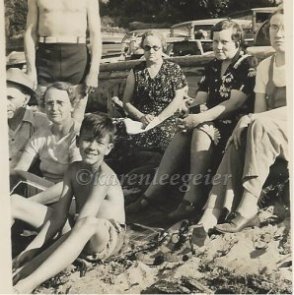
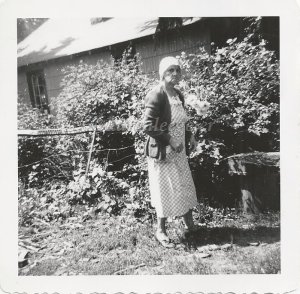
By the time Orah was 49 she’d lost both her husband and firstborn child. She was ill (diabetes and a weak heart). She took medication for her legs, nerves, and a bad eye. In spite of daily insulin shots, it doesn’t appear the diabetes was well-controlled. Orah was losing weight and felt weak. She spoke of having dentures. She fell several times. It appears she was sleep-deprived. Note the physical changes in the space of 11 years. Orah describes her tongue in the letter below as “read as a fire.” In March of 1941 Orah was 56.
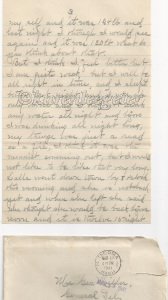
Lalla (my grandma) was divorced and needed help with dad; Orah had lost her husband and needed a place to live. The arrangement seemed beneficial for all. Orah lived with Lalla and my dad for many years, in fact, and was responsible for helping with household chores such as cooking, washing, feeding chickens, and food preservation. My grandma went to business school, later working for several companies in order to support the family, Orah included. I believe great grandma was bored, often writing about being tired of looking at the house. Note below left her lack of concern about dad’s evening meal.
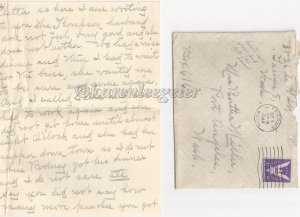
I began to wonder if something else had been festering. My sister had the same thought. Orah’s words seemed exceptionally harsh, worsening over time. She seemed resentful, almost jealous of Lalla’s relationship with my father. She referred to him as “the dear boy” and “the wonder boy.” The letters oozed sarcasm. She did not want him around, did not seem to care where he was or what he did. She wanted someone to beat the liver out of him. She wrote he would amount to nothing.
We discovered Orah whipped him, and that he ran from her, taunted her from afar. They stopped speaking to each other; it seems she resented that, too. Dad never told his mother about the beatings, and Orah never mentioned the taunting; it became a silent truce between them. Orah’s resentment ran deep. True, back then, hitting children in the name of “discipline” was common; however, when I wrote above that Orah “did not want him around,” she meant that in the severest possible way. Use your imagination.
Dad never disclosed. The letters? I guess he didn’t want to relive the pain. Dad came through it all exceptionally well thanks to the three ladies below (Lalla with her two younger sisters, Hazel and Bertha. Dad’s father wasn’t a presence). They gave dad the freedom to be himself, they loved him unconditionally, they encouraged him to fly. Lalla fought her own battles (she’s the star of “Why Grandma Cried”), but she was there for dad. He was her world, much to Orah’s displeasure.
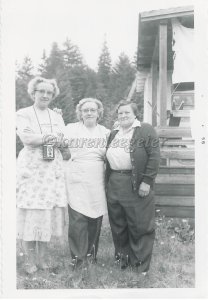
When I remember dad’s sometimes sarcastic nature, I can’t say for sure that he came by it naturally, but he may have. If nothing, I now understand the environment in which he was raised. He could do nothing right as per his grandma; neither could Lalla.The house was never clean enough, Lalla was never home at the right time, dad did nothing right. Nothing could please her; it went on and on. Rather than show dad how to do something, rather than work with him, Orah became enraged when he didn’t do as she expected. She decided he was lazy, but “always ready to eat.” (Does anyone escape teen hood without that often apt label?) I know what he came home to, why he stayed out until his mom came home. I know why he ran from his grandma.
All was not lost, however. Through it all, dad developed a tough skin. Note his response in this letter when Orah asked him to bring in wood: “get it yourself.” He was 15. Yeah, I’m smiling.
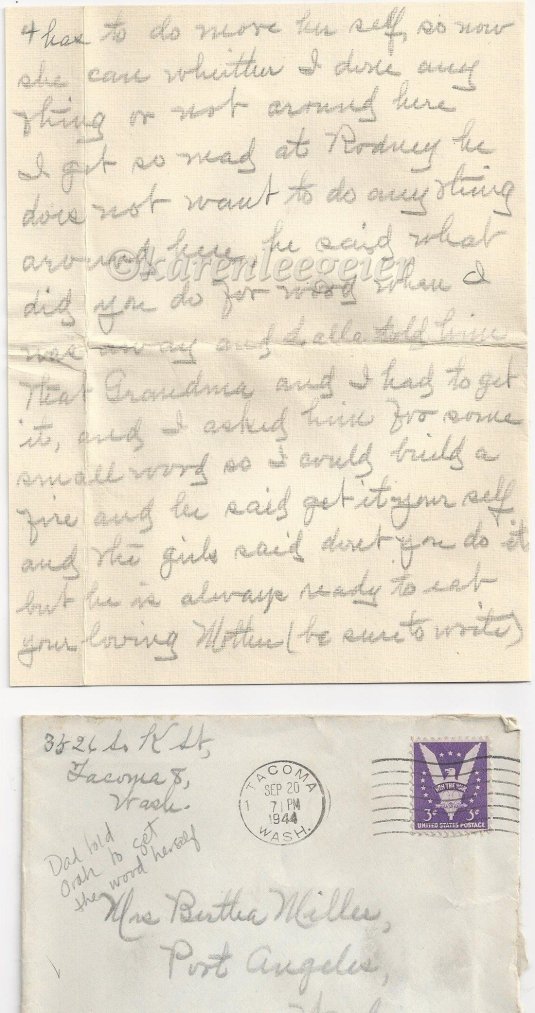
I won’t post the worst of Orah’s letters. You get the idea. Rather, I salute dad’s ability to right a wrong, to overcome. We’d previously thought dad was doted on in his early years, that he was pampered, even spoiled. Were we ever wrong.
So, what was Orah’s deal?
Fast forward to current thinking on aging. Dr. Bill Thomas, in an effort to reduce boredom, depression and loneliness commonly found among older adults, started the Green House Project (1). When older adults become bored, feel as if they have nothing to live for, or if they are isolated and/or ill, they can suffer unnecessarily. The Green House Project addresses depression, boredom, and loneliness among older adults. After reading her letters, I believe Orah suffered from all three afflictions. The never-ending sarcasm and negativity, combined with several medical and emotional conditions, lead me to believe Orah may have had another disorder.
I previously thought mental health issues occurred at or prior to birth, i.e. people with mental disorders came into the world as such. This isn’t necessarily true. Apparently, everyone is vulnerable, and it can happen at any time. Causes may come from: “stress, bereavement, relationship breakdown, physical and sexual abuse, unemployment, social isolation, and major physical illness or disability” (2). The “everyone” part raises eyebrows. Biological factors (genetics, infection, poor nutrition), psychological factors (trauma, loss, inability to relate to others), and environmental factors (death, anxiety, loneliness) may contribute to mental disorders (3). We’ll never know whether Orah had a mental disorder, but she certainly was high risk. I suspect something aside from her physical conditions played a part. One thing we do know: Orah was miserable and dad was her target.
Back to dad: Given the environment in which dad grew up, I have a new-found respect for the man who was my father and the woman who was his mother. Somewhere along the line he decided he had value; he sidestepped–OK, ran from–the early negativity. Orah may have knocked him down, but she didn’t keep him down. Dad developed many, many other healthy relationships along the way; he achieved success. He had a wonderful marriage, he developed many deep friendships throughout his working years. He loved his two aunts (who adored him). His daughters are appreciating him with new found clarity.
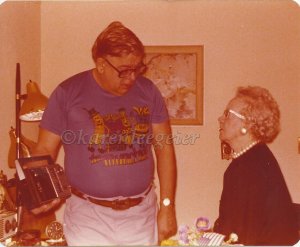
Dad was 21 when he joined the Navy. Letters sent home were well-written and loaded with humor. By 1950 he’d already been a business owner–he ran a shoe shop in Tacoma. It appeared dad was pretty “together.” He attended and graduated from St. Martin’s College after his time in the Navy. I was three weeks old, but I attended that graduation in May of 1959.
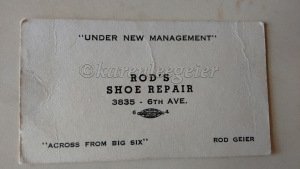
When I recall my father’s occasional salty tongue, I make no excuses. Rather, I see his life with more clarity. Nor will I make excuses for Orah. But I will say this: the sarcasm and dad’s abrupt nature–the very tendencies that made us think–are a very watered down version of what made dad smart. Whatever we label Orah, however we choose to view her methods and the affect it had on dad, he came away with a tough skin, a grit he never lost. Only the fittest survive.
Yes, he was hard to read and difficult at times. He was complicated. A filter and a chisel helped. If nothing, now I understand my father much better. And maybe, just maybe, if my children ever wonder, now they’ll understand “what makes you smart.”
(1) http://changingaging.org/the-green-house-project/.
(2) Myths, misunderstandings and facts about mental illness. (2007). http://www.health.gov.au/internet/publications/publishing.nsf/Content/mental-pubs-w-whatmen-toc~mental-pubs-w-whatmen-myth.
(3) Causes of mental illness. (2015). http://www.webmd.com/anxiety-panic/mental-health-causes-mental-illness
Karen’s note to family: First, I wish ill will on no one, alive or dead. Having said that, I believe in accountability. I won’t excuse poor behavior. I aim to tell the truth as kindly as I possibly can given what I’ve uncovered. I believe that is fair. Second, as I wade through the plethora of letters and documents, my intent is to gain further understanding of my father and his mother, to piece together this incredible gift of history, and to make sense of it all for posterity. Mom said something brilliant the other day about the younger generation not caring about family history until later in life. “Then it’s our job to have it here when they are ready.” I couldn’t agree more. Thank you, mom.
Children, this is for you: Tyler, Andrew, Kelsey, Brittany, Erin, Eric, Kye, and those that follow. I love you all.
Reflection: Have you gained an understanding of why your parents parented they way they did, and if so, do you see them in a different light? Have you found a way to forgive?
NEXT: What did they eat? Apples, cherries, and berries, and…watermelon pickles? A look at diet through the years. Scheduled: “Grandma’s Garden,” Friday, May 8, 2015.


You are so lucky to have this amazing insight! My mum rarely spoke of her own childhood which had been very difficult.. so this is a wonderful piece of history you are capturing for future generations of your family – Priceless! x
LikeLiked by 1 person
Dad was the same. We knew about Orah and had a general idea, but it took those letters for me to realize the extent of her wrath. I hope you’ve been able to find peace in your relationship with your mum. 💟
LikeLiked by 1 person
I think we have ‘softened’ with each generation since the 1950’s – we moan but they had it ‘tough’ as kids and in many ways perhaps we’ve gone too far the other way with our own children – I do see that in some respects in terms of how they take many of the ‘luxuries’ in life for granted.. No ‘make do and mend’ when they set up their first homes together anymore! The last few years of mum’s life when I was helping her live at home with her dementia actually bought us very close… We had our tougher days but for me the majority of time was a very ‘loving’ time for the first time in our relationship as she wasn’t able to show her emotion when she was young – she kept up a pretty ‘tough’ exterior. I also realised how ‘wise’ she had been which I didn’t always appreciate when I was younger and her wisdom as with your dad continues to be a big part of my life today! Thanks for sharing your dad with us Karen.. I think it helps us appreciate how lucky we are… xx
LikeLiked by 1 person
Thank you, Wendy. Sure wish we could sit down for a cuppa right now. There is so much here, so much to say, about your post. Hardly know where to begin, but, I agree and am so very glad you found peace in those final years with your mum. Interesting your comment about dementia and how that affected your relationship. My father seemed to mellow as well in his final months and years, and that offset those sometimes painful previous years. I hear dad’s voice all the time, and am forever grateful for the “lessons.” ❤
LikeLiked by 1 person
How great that would be Karen – I’d love to sit down, brew in hand and chinwag over those letters and our parent’s lives!! I’m grateful that we both have the experience of their wisdom living on in our lives.. and there were times in the past that I never thought I’d say that! I’m popping that tea bag into the pot…. xx
LikeLiked by 1 person
Talked with my mom today about those letters and her eyes brightened when I told her you read back on some of my early posts. She was THRILLED. Thank you again. ❤
LikeLiked by 1 person
Oh how absolutely wonderful! I’m delighted and thrilled too.. Get the kettle on I’m reading more today! x
LikeLike
🙂
LikeLike
So insightful. Our personalities are such a mixture between who we are naturally and the environments in which we were raised. I can certainly see similar influences in my own family. I know that my grandma was harsh on my mom and how that affects her and then our relationship. But I wonder, how was my grandma raised? Did she have that survivor grit from the depression and her own parents? Hopefully Tyler and I can leave a legacy of kindness that comes from our parents and trickles down to our kids and theirs.
LikeLiked by 1 person